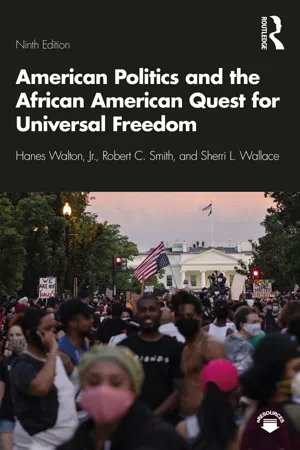
American Politics and the African American Quest for Universal Freedom
- 448 pages
- English
- ePUB (mobile friendly)
- Available on iOS & Android
American Politics and the African American Quest for Universal Freedom
About this book
This dynamic and comprehensive text from nationally renowned scholars continues to demonstrate the profound influence African Americans have had—and continue to have—on American politics. Using two interrelated themes—the idea of universal freedom and the concept of minority–majority coalitions—the text demonstrates how the presence of Africans in the United States affected the founding of the Republic and its political institutions and processes. The authors show that through the quest for their own freedom in the United States, African Americans have universalized and expanded the freedoms of all Americans.
New to the Ninth Edition
• Updated sections on intersectionality, dealing with issues of race and gender.
• Updated section on African American music, to include the role of Hip Hop.
• Updated sections on mass media coverage of African Americans and the African American celebrity impact on politics, adding new mention of the CROWN Act and the politics of Black hair.
• Updated section on the "Black Lives Matter" movement, adding a new section on the "Me Too" movement.
• Updated sections on African Americans in Congress, with a new mention of the Squad.
• Updated voting behavior through the 2020 elections, connecting the Obama years with the new administration.
• A comparison of the 2016 and 2020 presidential elections.
• A discussion of the way in which race contributes to the polarization of American politics in the 2020 presidential campaign.
• An analysis of the racial attitudes of President Trump, and the institutionally racist policies of his administrations.
• Updated chapter on state and local politics, including a new section on state executive offices and Black mayors.
• Updated sections on material well-being indicators, adding a new section on the coronavirus pandemic and the Black community.
• The first overall assessment of the Obama administration in relation to domestic and foreign policy and racial politics.
Frequently asked questions
- Essential is ideal for learners and professionals who enjoy exploring a wide range of subjects. Access the Essential Library with 800,000+ trusted titles and best-sellers across business, personal growth, and the humanities. Includes unlimited reading time and Standard Read Aloud voice.
- Complete: Perfect for advanced learners and researchers needing full, unrestricted access. Unlock 1.4M+ books across hundreds of subjects, including academic and specialized titles. The Complete Plan also includes advanced features like Premium Read Aloud and Research Assistant.
Please note we cannot support devices running on iOS 13 and Android 7 or earlier. Learn more about using the app.
Information
Chapter 1
Universal Freedom Declared, Universal Freedom Denied
Racism, Slavery, and the Ideology of White Supremacy in the Founding of the Republic
It must never be overlooked that the concept of freedom that emerged in the modern world bordered on licentiousness and created a situation that approached anarchy. As W.E.B. Du Bois has pointed out, it was the freedom to destroy freedom, the freedom of some to exploit the rights of others. It was, indeed, a concept of freedom with little or no social responsibility. If, then, a man was determined to be free, who was there to tell him that he was not entitled to enslave others.4
Freedom: A Typological Analysis
Orlando Patterson | Eric Foner | Richard King |
Personal | Natural Rightsa | Liberal |
Sovereignalb | Civil Rights | Autonomy |
Civic | Political Rights | Participatory |
Social Rights | Collective Deliverance |
Freedom, Power, and Politics
Table of contents
- Cover
- Half Title
- Series Information
- Title Page
- Copyright Page
- Dedication
- Brief Contents
- CONTENTS
- LIST OF ILLUSTRATIONS
- PREFACE
- PART I Foundations
- PART II Political Behaviorism
- PART III Coalitions, Movements, Interest Groups, Parties, and Elections
- PART IV Institutions
- PART V Public Policy
- Index